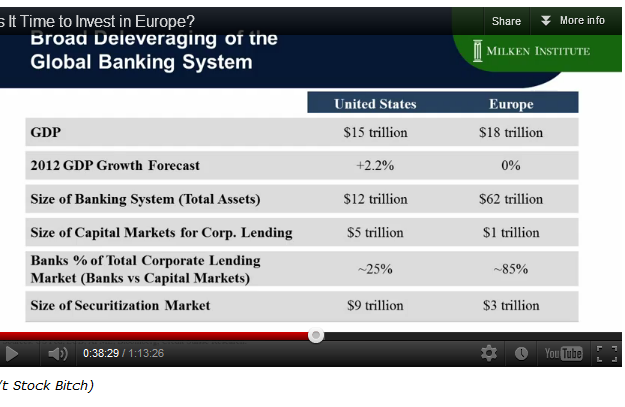There will undoubtedly be some intervention by the Fed and ECB in the coming weeks that will calm the markets.
I have spent a lot of time thinking about the dynamics of how the macro world would unfold since the “Great Recession”. I was more pessimistic than turned out to be warranted with respect to the short term performance of the equity markets. My pessimism was based on a belief that long run growth would be much lower in the next decade, and that the systematic imbalances in the global economy (US-Europe-China) would be very painful. I called for copper to fall in February of 2010, and I called for the purchase of CDS of Spain and Italy in May 2010. I was wrong about the former right about the latter. I also became aware of the OECD issue of structural unemployment. I chronicled these views in an article published in the Geopolitics of Energy titled “Gimme Shelter: Expect More Volatility in the Oil Market over the Next Decade”.
In my summary of that article I wrote
“We are entering a period of time where global imbalances can no longer go unattended. However, there remains significant uncertainty concerning how these imbalances will be resolved - in an orderly fashion or in response to a crisis? It is certain that global growth prospects will be lower for much of the next decade.
For those who are “certain” that the BRICs have decoupled from the developed world, that structural unemployment does not matter and the Europe and US will muddle through and will be back to 3%+ grow soon, I end with the words of the poet Yeats.
Excerpt from ‘The Second Coming’:
Turning and turning in the widening gyre
The falcon cannot hear the falconer;
Things fall apart; the centre cannot hold;
Mere anarchy is loosed upon the world,
The blood-dimmed tide is loosed, and everywhere
The ceremony of innocence is drowned;
The best lack all convictions, while the worst
Are full of passionate intensity."
My pessimism was bounded because while I thought from its beginning (2002) that Euro was untenable; I assumed that while things would be markedly worse in China and Japan -their situations still would be manageable.
In the intervening 6 months, I have spent a lot of time thinking about transition dynamics and end game, with the recent realization that the former is way more important than the latter. The unprecedented central bank balance sheet expansion by the Fed and ECB that has (temporarily IMO) buoyed the financial markets. Notwithstanding Europe is in recession and it looks
increasingly like China, Japan and the US are slowing down. In short - my macro call (that went against the herd) has been bang
on.
And yet I expected a better policy response from all countries then those that have been evidenced. I expect in the days to come that we will get a good news announcement from the IMF, ECB, Fed or Germany on the Eurozone or US economy that will comfort the markets and reverse the markets current free fall. I am even more convinced that what will be offered will just kick the can down the road and that the road is approaching the end of the cliff.
I have become convinced by my studies that policy makers have lost the ability to manage the system and some sort of catastrophic wash out even in the global economy and stock market is coming. There isn’t a single country that is correctly managing its policy response correctly, (imo, though the US is the least bad of a terrible cohort).
As an example, below is a screen shot of a slide shown at a recent Milken Institute panel at which Hugh Hendry was one of the participants. There is 62 Trillion in loans the European banking system – many of these will have to be sold for Basil 3.(BTW as a frame of reference world GDP was 63 Trillion USD in 2010.) How much deleveraging is required is difficult to say for sure because I am not sure how much the shadow banking system differs between them. If you assume shadow banking is the same for both than the European Banking system will have to decrease by more than 50%. How much will Basil 3 require? How much can they fudge? How much will be purchased by the ESM/ECB? Regardless, this is inherently deflationary. And then you have the inevitable China and Japan writedowns. Even massive central bank money printing by these countries will make the USD stronger and be inherently deflationary for countries the US (and Canada). It seems not unreasonable that there needs to be a credit writedown across the world that begins to approach 1/2 to 1 year of world GDP. This seems like the mother of all credit market events.
My macro view is that Europe and China are going to be trying to devalue against the USD and that this will be inherently deflationary. So I am expecting a massive wave of deflation prompted by a hard landing (collapse) Europe China and Japan. The policy response to this will be massive money printing and inflation. It appears that deflation follwed by inflation will be the transition dynamics.

 RSS Feed
RSS Feed
